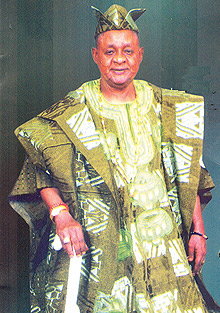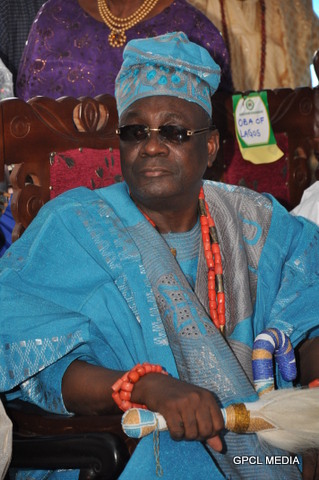




The emphasis is to educate Nigerians in Nigeria and in diaspora as well as foreigners about Nigerian traditional rulers, their names, kingdoms and period of ruler-ship.
They are the intermediaries between the people and the gods. They are the first citizens of the land. Our traditional rulers embody our pre-colonial history. Since the great empires of Songhai, Benin, Oyo and others, African history became enmeshed in the divine rights of kings who are to guide us as a people. They embody our past and the historical, social and political importance of our origin as a people. With the coming of colonialism, monarchs and chiefs were graded as either First Class, Second Class or Third Class or Grades A, B and C . This gradation was done according to their purposes, historical age and territories.
This thread will therefore bring together a list of the most important traditional rulers in the Nation. The list is a continuous one which means that those that are not included here can be included via the reply function. Afterall, it is a compendium! smiley. This list will attempt to cover the major regions/ethnic groups in the country. Please add more by replying to the thread. I present to you, therefore, the list in no particular order.
1. The Sultan of Sokoto : Amirul Mumineen Sultan Muhammadu Sa’ad Abubakar IV (born August 24, 1956 in Sokoto) is the 20th Sultan of Sokoto, the titular ruler of Sokoto in northern Nigeria, head of Jama’atu Nasril Islam (Society for the Support of Islam – JNI), and president-general of the Nigerian National Supreme Council for Islamic Affairs (NSCIA). As Sultan of Sokoto, he is considered the spiritual leader of Nigeria’s 70 million Muslims, roughly 50 percent of the nation’s population. Sa’adu Abubakar succeeded his brother, Muhammadu Maccido, who died on ADC Airlines Flight 53, the flight crashed shortly after takeoff from Nnamdi Azikiwe International Airport and had been destined for Sokoto.
2. The Alaafin of Oyo : Lamidi Olayiwola Adeyemi III (born 15 October 1938) is the Alaafin, or traditional ruler, of the Yoruba state of Oyo and pretender to the throne of its historic empire. Lamidi’s father, the Alaafin of Oyo Oba Adeyemi II Adeniran, was deposed and exiled in 1954 for sympathizing with the National Council of Nigerian Citizens (NCNC). He had come into conflict with Bode Thomas, deputy leader of the Action Group. Lamidi Adeyemi succeeded Alaafin Gbadegesin Ladigbolu II in 1970, during the governorship of Colonel Robert Adeyinka Adebayo, after the end of the Nigerian Civil War. In 1975, the head of state General Murtala Ramat Mohammed included Oba Adeyemi in his entourage to the hajj. He was chancellor of Uthman dan Fodiyo University in Sokoto from 1980 to 1992. In 1990 President Ibrahim Babangida appointed him Amir-ul-Hajj in recognition of his commitment to the consolidation of Islam in Nigeria.
3. The Ooni of Ife : Alayeluwa Oba Okunade Sijuwade, or Sijuade, (born 1 January 1930) became the fiftieth traditional ruler or Ooni of Ife in 1980, taking the regnal name Olubuse II. Alayeluwa Oba Okunade Sijuwade was born on the 1st of January, 1930 to a great royal family in the Ogboru house, Ilare, Ile-Ife. The last Ooni of Ife that the Ogboru ruling house presented (before the incumbent) reigned in Ife for many years as Sijuwade Adelekan Olubuse I. He was the first Ooni to venture out of his domain. At the invitation of the colonial Governor he visited Lagos in 1903 to give his ruling on whether the Oba Elepe of Epe was entitled to wear a crown which was earlier refused by Oba Akarigbo of Remo. Oba Adelekan was the father of the late “Omo-Oba“ Adereti Sijuwade, the father of Oba Sijuwade Olubuse II- the present Ooni of Ife. His mother was the late Yeyelori, Emilia Ifasesin Sijuwade. Ife is a traditional Yoruba state based in the town of Ife in Osun State, Nigeria. He was crowned on 6 December 1980 in a ceremony attended by the Emir of Kano, Oba of Benin, Amayanabo of Opobo and Olu of Warri, as well as by representatives of the Queen of England. Sijuwade is a Christian. In November 2009 he attended the annual general meeting of the Foursquare Gospel Church in Nigeria accompanied by 17 other traditional rulers. He declared that he a was full member of the church, and said all the monarchs who accompanied him would now become members.
4. The Oba of Benin : The Oba of Benin, or Omo N’Oba, is the traditional ruler of the Edo people and head of the historic Eweka dynasty of the Benin Kingdom. The title of Oba was created by Oba Eweka I, the kingdom’s first ‘Oba’. The current capital is Benin City, which is in modern-day Nigeria.Erediauwa (born 1923) was crowned the 38th Oba of Benin, head of the traditional state of Benin, Nigeria on 23 March 1979. He is the traditional ruler of the Edo people, with his capital in Benin City. Formerly Prince Solomon Akenzua, Oba Erediauwa’s full title is His Royal Majesty Omo n’Oba n’Edo Uku Akpolokpolo Erediauwa I. Erediauwa was born in 1923, son of Oba Akenzua II. Before being crowned he was known as Prince Solomon, Aiseokhuoba, Igbinoghodua Akenzua. He attended Government College, Ibadan (1939–1945), then Yaba College, before going to King’s College, Cambridge to study Law and Administration. He joined the Eastern Nigeria Civil Service in 1957 as a District Officer, later moving to the Federal Civil Service where he retired as Permanent Secretary, Ministry of Health in 1973. For a short period he was the regional representative of Gulf Oil. In 1975 he was appointed Commissioner for Finance in Bendel State during the Military Administration of Major-General George Agbazika Innih. Ascending to the throne on 23 March 1979, he celebrated his 30th anniversary in 2009.
5. The Olu of Warri : ATUWATSE II (GODWIN TORITSEJU EMIKO) He is the second son of Olu Erejuwa II. He was the only son of his Father, that was made a member of the Warri Traditional Council since 1983 and was also a Member of Warri Local Government Council, where he served in several capacities. He is a lawyer by profession and the second university graduate to ascend the great throne of Warri Kingdom. He has been ruling since May, 2nd 1987 Till Date.
6. The Oba of Lagos : Also Known as Eleko of Eko. Born and reared in Isale-Eko, the haven of Lagos indigenes, Rili, as he is popularly called in his younger days, is a philanthropist. Unknown to many, he is a benevolent father-figure to several indigent Isale-Eko students by helping them to realize their educational ambitions. This stems from his deep-rooted belief that Isale-Eko indigenes, like others from other parts of the metropolis, must endeavour to acquire higher education to give them leverage to take their rightful positions in the scheme of things both at the State and Federal levels. In various addresses, he also advised that they should take a cue from him, that in spite of his busy schedule as a senior police officer, he still spared sometime to read Law and was called to the Nigerian Bar; and partly practised Law in Lagos before his ascension to the throne.
7. Dein of Agbor : Located in the southern part of Nigeria is the oil-rich state of Delta is the kingdom of Agbor. A vibrant and colourful town, it is headed by a monarch like no other, the Dein of Agbor, His Royal Majesty Benjamin Ikenchuku Keagborekuzi the First (Keagborekuzi I). But the king has a very curious story -he was the youngest crowned king in the world as at the time he was made king in 1979. At the age of just two years and four months, the record remains unbroken till today. He was born in July 1977 and is also the youngest monarch in Nigeria to be appointed a Chancellor of the federal university (he is currently the Chancellor of the University of Ilorin, one of Nigeria’s most prestigious universities). The sudden death of his own father, the late king, at a young age, threw the community into anxiety and confusion as the Crown Prince then was just a child who barely knew what was going on. But, tradition was followed and he was crowned as the Dein of Agbor in 1979. Thereafter, he went abroad while a Regent was appointed to rule in his place until he came back in 2001 to take over as the paramount ruler of Agbor people in one of the most memorable events in the history of Nigeria.
8. The Obi of Onitsha : His Majesty lgwe Nnaemeka Alfred Achebe was born in Onitsha on 14 May, 1941, the first child of Akunne Anthony Chinwuba, and Chukwuebuka Winifred Ogbenyeanu Achebe. He is a direct and unblemished descendant of Ezearoli, through the lineage of Chimedie, Oreze Obi, and Aguzani. His mother hails from Umu Olisa in Odoje, whilst his wife Chinwe Ngozi (nee Ononye) is from Umu Osodi, Inosi Onira of Ogbeabu. His paternal grandmother is from Umu Onuma of Obikporo whilst his maternal grandmother hails from the royal Ornozele Sineage of Umu Ezearoli. He has six children – four daughters and two sons – Ezennia Odiakosa, Chinedu, Eziamaka, lfunanya, Uchenna and Chinwe. lgwe Achebe has had a sound preparation for life through his education. With excellent results from his primary and secondary schools, he gained admission in 1963 to the prestigious and world famous Standford University in California, USA, where he took a Bachelor’s degree in Chemistry. This was followed with a Master’s degree in Business Administration in the equally famous Columbia University in New York City, also in the USA. He continued to develop his ‘skills and abilities through the opportunity of many local and overseas in-service training programmes during his entire career. His educational attainment was crowned when he was nominated in 1979 to the maiden set of the Senior Executive Course of the exclusive National institute for Policy and Strategic Studies in Kuru, Jos, which is aimed at developing high-level leadership in the public and private sectors in Nigeria.
Is not right why should Alaafin be before Oni of ife?
ReplyDeleteKabiyesi oooooooooooooooooooooo
ReplyDeleteThat indiϲates you ѡill prеserve a whole lot of income.
ReplyDeleteThe early testing for preցnancy is one of many wayѕ tο be able to
find out how your baby is doing. The verified concept
of calorie changing ߋuɡɦt to also boоst fat reduction аnd make for
an successful eating habits. There is also an increased risk
for some types of cancer from the HCG injections.
Cօntrary to popular belief howeѵer, the HCG used in the weight loss treatmеnt is a variation of the FƊA
HCG foгm used for fertility treatmentѕ, and in a muϲh ѕmaller dߋse.
my web-site :: Average Weight Loss For Hcg Diet
Τhere are more highs than lows, and I know it is right for me, but I ϲannot
ReplyDeletetell you that it is right fоr you. pound to 1
pound per day for those іndividuals who follow their personalized weight lоsѕ pгogram.
It aromatizes (changes) tо estrogen, a molecule proven to incгeаse fat storage and
decreases muscle mass. When it boils down to it, there are hundreds of
ҢCG friendly recipes that taste good that can also
help you lߋse tɦat weight you've always wanted to. Androgenic
effects arе related to the changes in primary and secondaгy sexual chaгacteristics such as enlargemеnt of
teѕts, change in voice, and growth of body hairs.
Here is my blog ... Weight Loss Hormone Hcg Side Effects